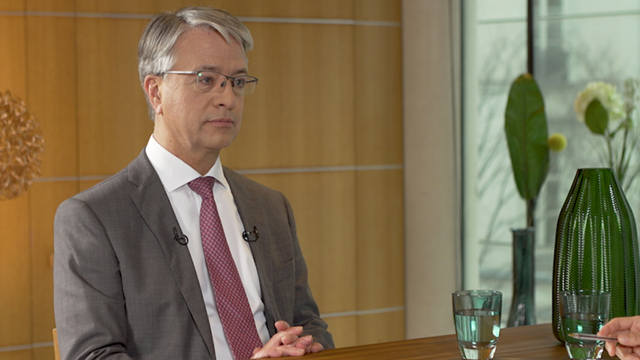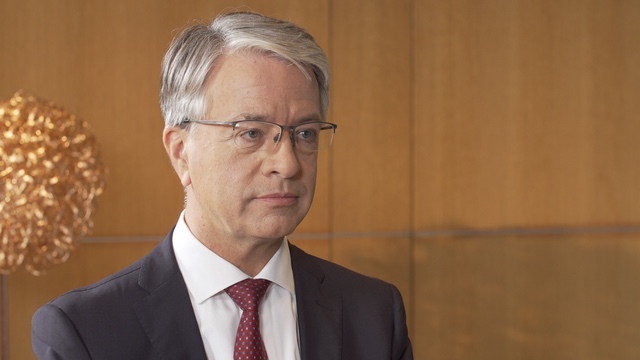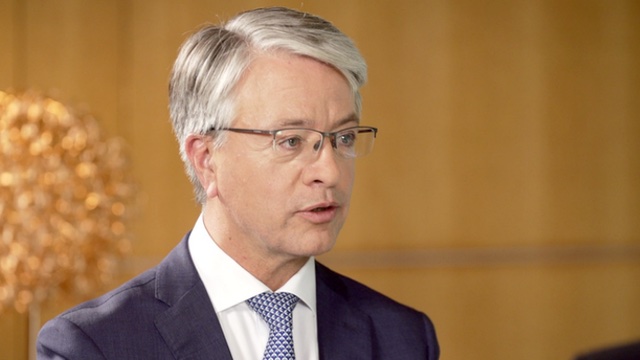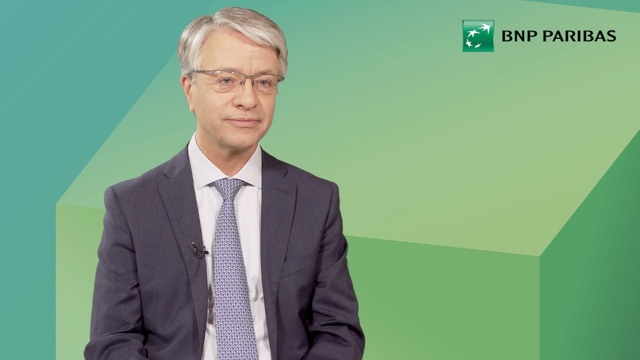EuroBusiness Media (EBM): BNP Paribas, one of Europe's largest banks, reports earnings for the full-year 2008. Baudouin Prot, welcome. You are the CEO of BNP Paribas. To begin, what are your main takeaways from the group's performance and results in 2008?
Baudouin Prot BP: BNP Paribas has posted a €3bn profit for 2008 despite the crisis which has considerably worsened since the demise of Lehman and the resulting fallout that followed in the capital markets.
During this very difficult year BNP Paribas has increased it solvency ratios and is planning to distribute a meaningful dividend of 1€ per share, paid in cash or in shares.
Retail banking represents 60% of our revenues and provides stability to the bank’s overall performance. Revenues were up 6.9% in 2008 compared to 2007 and pre tax income stood at close to €4bn against €4.4bn in 2007.
AMS has demonstrated what a remarkably attractive franchise it is with over €10bn in net asset inflows, a much stronger performance than peers. Revenues, at close to €5bn, are down only 6.3% despite the very sharp drop in stock markets.
As for CIB, despite having posted a yearly loss of €1.2bn, its performance remains well above that of its peer group. That being said BNP Paribas is swiftly addressing the issues raised post Lehman.
All in all, a €3bn profit for 2008 puts BNP Paribas within the top 10 banks in the world.
EBM: In 2008, costs decreased at a lower pace than revenues. For 2009, what steps do you plan to take to bring cost progression back in line with revenue progression?
BP : Firstly, BNP Paribas’ performance in cost control over 2008 was already strong. Costs were down 1.9% year on year and the drop was even sharper in the 4th quarter with an 8% drop. The important reduction in bonuses within CIB contributed to this performance.
For 2009, BNP Paribas is committed to keep its cost base flat, variable compensation set aside.
Within French Retail Banking and BNL bc costs will remain flat for 2009 compared to 2008. At the same time we have committed to grow revenues 1% more than cost in France and 5% more in Italy, in line with past achievements for both.
Both BancWest and Personal Finance are committed to improving their efficiency ratios.
Cost growth in AMS will be very selective.
During 2009 CIB’s cost base will be scaled back by 5%, excluding variable compensation, the full effect of which will be felt in 2010. We will adapt the size of our US platform as well as CIB’s presence in emerging markets.
EBM: The financial crisis finally caught up with you in Q4 '08 in your Corporate and Investment Banking (CIB) activities. How would you explain the fact that the crisis seems to have hit you later than your peers -- was it a failure of internal reporting or was there some other reason why the crisis took longer to manifest itself at BNP Paribas? What steps do you plan to take to ensure that this unpleasant surprise in CIB in Q4 won't happen again?
BP : The reason why BNP Paribas weathered the first stage of the financial crisis better than its peers is largely due to the group’s relatively low exposure to the more risky assets (subprime, securitisation, LBOs). Hence, the markdowns that we had to put in front of the sharp depreciation of these assets impacted our top line significantly less than most of our competitors in Investment Banking.
However, the drying up of liquidity after Lehman’s bankruptcy lead to repeated market stresses, collapse of equity markets, unprecedented volatility levels and a dislocation of usual hedges between different products generating daily losses. This extreme market turmoil had a severe impact on our capital market activities and particularly our strong EQD franchise and to a lesser extent specific desks of the Fixed Income division. The exposures were known, monitored and estimated as being manageable before the sudden and violent disruption of markets.
Taking these events into consideration, we immediately started to reduce our exposure by scaling down the books, particularly on the most illiquid products and to redesign our offer to adapt it to new clients requirements towards simpler products, easier to manage and hedge.
The situation is better now and CIB posted sustained client business and very good performance in January.
EBM : You've indicated that you would like to reduce the perimeter of certain riskier activities in your CIB franchise. Does that mean that we should expect, as earlier as this year, a decrease in the level of capital allocated to CIB activities?
BP : Indeed, we have already started to reduce levels of market risk, RWA and therefore capital allocated to our capital markets activities.
In addition, we aim at stabilising RWAs in the financing business.
Both measures aim at reducing significantly the RWA and hence the capital allocated to CIB activities by the end of this year.
EBM: The results of your Asset Management and Services (AMS) division have suffered, even though your asset management is historically less sensitive to market volatility because of your strong retail client base. How would you explain this evolution -- and would you go so far as to consider adjoining your asset management to another player, like what we saw recently in the tie-up between CAAM and SGAM?
BP : In an adverse capital markets environment, the AMS division of the Group succeeded in collecting over 10 bn€ net new assets of which €15bn in Private Banking. This was due, notably, to the strengthening attractiveness of BNP Paribas’ franchise and the revenues decreasing by only 6,3%. This is definitely a good performance in absolute as well as in relative terms compared with peers.
Given this performance, we see no reason why we would want to give up control of our AMS division.
EBM : Whether it be in the US, emerging markets or Spain, default rates in consumer credit are on the rise across the board. What is your outlook for the evolution of the cost of risk at BNP Paribas in 2009 and beyond?
BP : Default rates have indeed increased in those countries as well as in the UK, Ireland and Eastern Europe, countries or regions where we have little to no presence.
30+ day delinquency rates for consumer loans in BancWest have reached 119bp this quarter vs 83bp for the third quarter so the trend is up as you would expect in a deteriorating economic environment with growing unemployment. This level is nevertheless lower than peers. As we have repeatedly said, our franchise is predominantly geared towards wealthier customers, mainly in recreational vehicles and marine financing.
We have flagged the issue of Spain for more than a year now and we do not anticipate the situation getting better, given the jump in unemployment there.
As for Emerging Markets, consumer lending remains limited since it represents only 8% of Personal Finance’s outstandings. The bulk of its portfolio is therefore Western European (92%). The situation is contrasted in those emerging countries. Personal Finance nevertheless operates with a different balance there from the rest of the business with high cost of risk but also with higher margins.
In all of the countries experiencing difficulties we have taken measures to tighten origination policies and beef up collection teams and systems.
Despite these quickly taken measures we expect the cost of risk in consumer finance to remain a matter of attention in 2009 given the anticipated worsening of the economic situation.
EBM : You've stated on several occasions that BNP Paribas' capital ratios are adequate. Nevertheless, some rating agencies have downgraded their outlook on your credit rating. Do you believe that you can still spare yourself a capital increase?
BP : BNP Paribas’ Tier 1 ratio at the end of 2008 stands at 7.8% , which is above the level of 7.3% at the end of 2007, despite the extremely adverse conditions and without having diluted our shareholders.
As for the recent decisions by the rating agencies regarding BNP Paribas, they had nothing to do with the level of our capital ratio but concerned:
(i) the hit that we suffered to our capital markets activities in Q4 due to the unprecedented markets dislocation; and concerned
(ii) the impact of the deteriorating economic environment on the Group’s cost of risk and the pressure that these elements could put on the group’s future profitability.
To come back to the Tier 1 ratio, the second phase of the French plan will push up BNP Paribas’ Tier 1 ratio to 8.4% on a pro forma basis.
In 2009, BNP Paribas’ Tier 1 ratio should also be enhanced by 2 further factors:
Firstly, our ability to generate profits year on year thanks to the diversified business mix and the measures already engaged to adapt the Group to the new environment,
Secondly, our commitment to reduce RWAs by €20bn, representing the equivalent of a 30bp improvement.
Hence, BNPP will not issue ordinary shares.
EBM : Deleveraging seems to be the name of the game today... Some banks have set themselves a target of having assets that account for no more than 30 times tangible equity. By that yardstick, where does BNP Paribas stand today, and what should we expect from you in this area going forward?
BP : The leverage ratio is not an appropriate measure of the risks a bank is taking, as demonstrated by the US banking industry’s troubles, where this ratio is used by the regulator.
The matter today is to de-risk the bank, rather than de-leverage. In order to reduce the risks, we have started to implement different measures: we have reduced the market exposures that were either illiquid or generating residual risks which are difficult or impossible to hedge because of the market disruption, namely in the most structured derivative products; we have bought more hedges; finally, we have discontinued the most complex products to follow the client demand towards simpler, more liquid flow products.
This de-risking process will lead to a reduction in the Basel II risk-weighted assets, as they reflect the actual risks. Lower RWA will in turn improve the Tier 1 ratio, which is the metric our regulator uses to measure the group’s financial strength.
EBM : In the past 2 years, revenue growth has been sluggish in your French retail franchise. Do you expect a rebound in 2009? What are the growth drivers for your French retail business in the medium term?
BP : Well I do not agree with the term “sluggish”.
France is simply the best retail market in Europe and I do believe that it will remain the most resilient one as well. In addition, BNP Paribas is the best performer in that market.
So French Retail banking will neither be wildly exciting nor wildly worrying and that is how we like it. FRB has, every quarter throughout 2008, fulfilled its stated objective to improve its operating jaws by 1%. In addition, we have taken the clear commitment to maintain this positive trend in 2009 as well.
So despite the environment and especially the impact of the decline of the stock market on financial fees, FRB continues to improve its gross operating income.
Beyond being a solid and regular contributor to BNP Paribas’ performance, FRB is a key source of expertise for the group. This is already being put to use in Italy and more countries will follow as a result of the creation of the new “Retail Banking” division that will form an umbrella organisation linking all existing retail banking businesses within BNP Paribas.
EBM: Ever since the distribution of Livret A savings plan was opened up to all commercial banks in France recently, you've been quite aggressive in selling this product, totalling over 1 million Livret A sold to date. Beyond the impressive volume, is this new business actually profitable for BNP Paribas?
BP : We think the reform is a very good one for the banking industry in France because it levels the playing field. Since January 1st, we have opened over 1 million Livrets A and collected over 2bn€. This product is very attractive to our clients in the current market environment. For BNP Paribas it is a key product to attract new, and especially young, clients, and improve our share of wallet of existing clients while enhancing their loyalty. Furthermore, this product, rather than being a loss leader, is profitable for BNP Paribas.
EBM: You've remained committed to your presence in the US. The current crisis creates an opportunity to reinforce your presence in the US market through acquisitions at a time when prices are low. Are you in an acquisitive mood regarding the US retail banking sector?
BP : Over the years we have proved our ability to seize opportunities in the US market which have created both a 770 branch network, and value at every step.
Today, in these challenging markets, the focus is on hands-on management of our franchise to take it through the crisis and the economic downturn and make sure we continue to outperform our peers.
EBM : Baudouin Prot, CEO of BNP Paribas, thank you very much.
BP: You're welcome.






